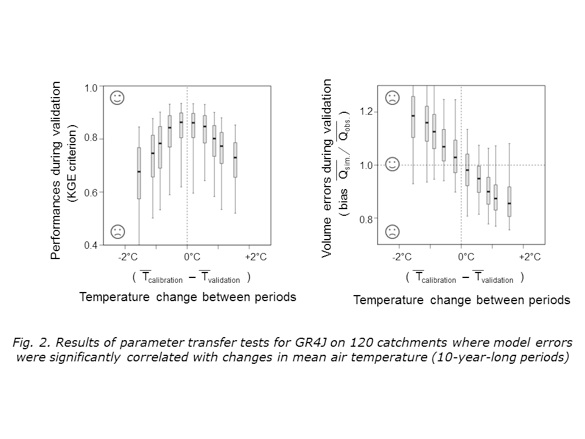PhD thesis
More precisely, the research work carried out in this thesis aim at improving knowledge with regard to the following questions:
-
•What is the robustness level of conceptual hydrological models in the context of a changing climate?
We answer this item through the study of temporal variations of model performances in relation to parameters transfer conditions (e.g. errors in flow volumes or dynamic related to changes in mean rainfall or temperature during transfer). Numerous catchments and several hydrological models are included in this evaluation procedure. -
•What are the causes for the lack of model robustness and are there ways to prevent such situations?
We try to carry out an exhaustive diagnostic of the issues on temporal transferability detected in our tests. We aim at identifying their causes and then suggesting potential ways to improve hydrological models robustness in the context of changing climate.
This work is led through multiple calibration and validation tests for different hydrological models over almost 600 catchments located in south-eastern Australia and in the southern half of France. The results show the existence of correlations between robustness issues during parameters transfer and changes in climatic conditions between the periods involved in the transfer (cf. fig. 2). At the same time, there is a high heterogeneity in the behaviours observed: climatic variables or the type of model errors for which correlations are detected change from one catchment to another. In spite of our efforts through various investigations, we were not able to provide convincing explanations for this heterogeneity.
Abstract
Hydrologists are increasingly asked to estimate the mid- and long-term evolutions of surface water resources in the context of climate change. To produce such projections of discharge, they feed hydrological models with future climate scenarios. However these are not sufficient for decision makers and hydrologists are often required to provide a quantification of the uncertainties associated with these projections. Every step of the modelling chain applied in such studies is a source of errors which propagate downwards to affect projected flows. As any other partakers in this modelling process, hydrologists have to estimate the contribution on total errors of their modelling step (i.e. hydrological modelling), independently from errors associated with the other steps. How confident would we be with our flow simulations, if future climate projections could be perfectly known?
Hydrological models are meant to reproduce the transformation process from climate forcings to river runoff on a given territory. Existing conceptual models require a calibration phase where parameters are adjusted to maximize the fit between simulations and measured processes (e.g. runoff dynamic and volumes). Using a model on a period different from the calibration one rely on the assumption of parameters “temporal transferability”, i.e. the possibility to use the model’s parameters under conditions different from the model’s construction ones. Studying this transferability in the context of a changing climate constitutes the core issue investigated in this Ph.D. thesis, which is synthetically represented in the following diagram.
How robust are conceptual hydrological models
in a changing climate?
Diagnosis on a set of French and Australian catchments
PhD from AgroParisTech University.
Thesis defended on March 26th, 2013 before a jury composed of:
Ms. Anne-Catherine FAVRE LTHE (Grenoble, France)
Mr François ANCTIL Laval University (Québec, Canada)
Mr Thierry LEVIANDIER ENGEES (Strasbourg, France)
Ms. Christel PRUDHOMME CEH (Wallingford, United-Kingdom)
Mr Rémy GARCON EDF-DTG (Grenoble, France)
Mr Hubert SAVENIJE TU-Delft (Delft, the Netherlands)
Ms. Marie BOURQUI EDF-R&D (Chatou, France)
Mr Vazken ANDREASSIAN Irstea (Antony, France)
President
Examiner
Examiner
Examiner
Examiner
Examiner
Supervisor
PhD Director
PDF (in French) available at: http://tel.archives-ouvertes.fr/



